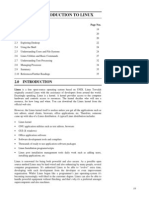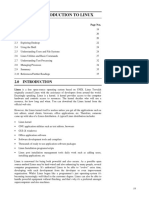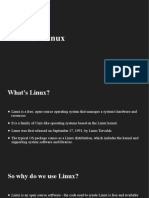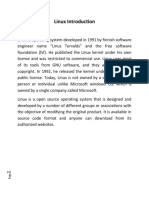0% found this document useful (0 votes)
7 views1 pageLinux Basics Introduction
Linux is a free, open-source operating system created by Linus Torvalds in 1991, known for its flexibility and community-driven development. Key features include multiuser support, multitasking, strong security, and portability across hardware platforms. Popular distributions like Ubuntu, Fedora, and Debian cater to various user needs, making Linux suitable for web servers, development environments, and personal computing.
Uploaded by
inobiwtowaCopyright
© © All Rights Reserved
We take content rights seriously. If you suspect this is your content, claim it here.
Available Formats
Download as DOCX, PDF, TXT or read online on Scribd
0% found this document useful (0 votes)
7 views1 pageLinux Basics Introduction
Linux is a free, open-source operating system created by Linus Torvalds in 1991, known for its flexibility and community-driven development. Key features include multiuser support, multitasking, strong security, and portability across hardware platforms. Popular distributions like Ubuntu, Fedora, and Debian cater to various user needs, making Linux suitable for web servers, development environments, and personal computing.
Uploaded by
inobiwtowaCopyright
© © All Rights Reserved
We take content rights seriously. If you suspect this is your content, claim it here.
Available Formats
Download as DOCX, PDF, TXT or read online on Scribd
/ 1
































































